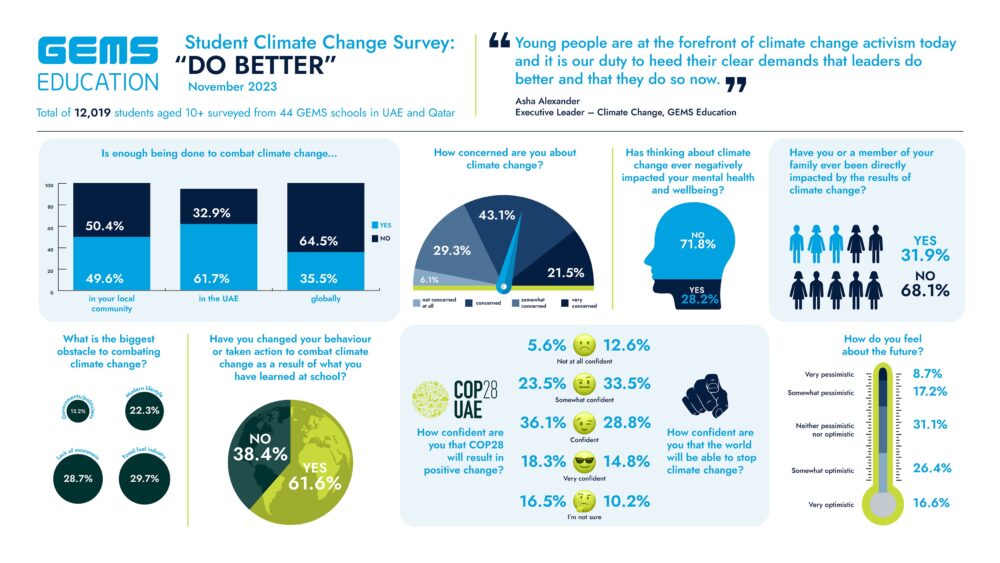More than 12,000 students from GEMS schools participated in the survey
Dubai, Nov 27, 2023: Close to two thirds of young people feel that not enough is being done to combat climate change, one in two lack confidence that the world will be able to stop climate change, and less than half feel a sense of optimism about the future. That’s according to a recent survey that gauged the views of 12,019 students aged 10 and above. The online survey was conducted by GEMS Education in November 2023 amongst students of 44 GEMS schools across the UAE and Qatar.
As Dubai welcomes delegates from around the world for the United Nations’ COP28 climate change conference, the GEMS Student Climate Change Survey reveals that the overriding message from young people in the region is unequivocal: they demand that world leaders do better, they demand action, and they demand it now.
Commenting on the results of this landmark survey, Asha Alexander, Executive Leader – Climate Change at GEMS Education says, “Young people are at the forefront of climate change activism today, and it is our duty to heed their clear demands that leaders do better and that they do so now.
“As children discuss and debate the topics around climate change, they are clearly concerned by the inaction, as they will be the generation that will bear the brunt of climate change. The survey highlights students’ uncertainty over whether nations and leaders will make the right choices.”
The power of education
The survey underscores the important role of education in raising awareness about climate change and inspiring action. Just more than a quarter (25.9%) of students said school is their main source of information about climate change – the second largest segment after 37.7% of respondents who pointed to ‘social media’ as their main source of information.
A large 78.5% of respondents believe that climate change is human induced, with 18.3% unsure. A majority 87.6% say that climate change should be taught in schools, while 61.4% are satisfied that they are learning enough about climate change, 29% want more to be taught, and the remaining 9.6% favour less.
Spreading awareness
About 97.4% of respondents said that they are aware of climate change at varying levels, 29.6% describing themselves as ‘very aware’, 45.4% as ‘aware’, and 22.5% as ‘somewhat aware’.
More than half of respondents (51.5%) said that they talk about climate change with their friends and peers and 56.1% family.
About 28.2% of students surveyed indicated that thinking about climate change has had a negative impact on their mental health and well-being. An even larger 31.9% answered ‘yes’ when asked whether they or a member of their family have ever been directly impacted by the results of climate change.
These results provide schools and educators with food for thought as they look to balance much-needed climate change education with emotional and well-being support for students as they come to terms with the impact and potential long-term consequences of climate change.
Alexander explains, “The reality of climate change will influence where students decide to live, how they use transportation or how much they travel, and what they buy as consumers.
“To date more than 5,000 teachers at GEMS Education have acquired climate change certification through UN CC:Learn, thereby enabling them to educate our students better through a sound understanding of climate science. It is also important to acknowledge and validate students’ feelings of anxiety, and so we raise awareness around these issues to help them understand why it is important to take action.”
Students’ views on the work being done to combat climate change vary. At a local community level, 50.4% of respondents feel not enough is being done. This contrasts with the 67.1% who believe the UAE is doing enough at a national level. Zoom out further to a global perspective, and the picture becomes less positive, with 64.5% of students saying the world is not doing enough.
When respondents were asked to identify the biggest obstacle to combating climate change, the response was mixed: 29.7% (the largest segment) pointed to the ‘fossil fuel industry’; 28.7% to a ‘lack of awareness’; 22.3% to today’s ‘modern lifestyle’; and 13.2% said ‘governments/politicians’ most stood in the way of climate action.
When it comes to assessing their own future, more students expressed optimism than pessimism, with 43% either ‘very optimistic’ (16.6%) or ‘somewhat optimistic’ (26.4%), versus 25.9% declaring themselves either ‘very pessimistic’ (8.7%) or ‘somewhat pessimistic’ (17.2%). The largest segment with 31.1% remained on the fence, however, being ‘neither pessimistic nor optimistic’.








